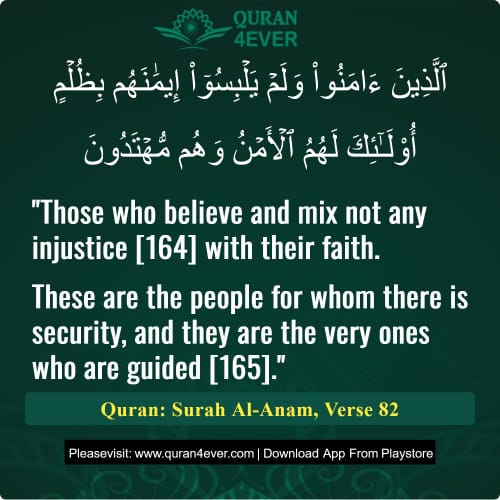
Transliteration:( Allazeena aamanoo wa lam yalbisooo eemaanahum bizulmin ulaaa'ika lahumul amnu wa hum muhtadoon )
"Those who believe and mix not any injustice [164] with their faith. These are the people for whom there is security, and they are the very ones who are guided [165]."
In this verse, faith refers to both verbal and heartfelt belief in Allah, while injustice signifies shirk (polytheism). The disbelievers of Makkah believed in Allah yet associated idols with Him, wrongly thinking it complemented tawheed. This verse rejects such belief completely. It is not about sinful Muslims but those who mix belief with shirk, which is a grave wrong as stated in Surah Luqman:13.
Those who uphold pure monotheism are granted true security—in this world, in the grave, and in the Hereafter. They are protected from shirk, and though they may face worldly trials, they will be safe from divine punishment. Such believers are the rightly guided, living in the light of truth and secured by Allah’s mercy.
The tafsir of Surah Al-Anam verse 82 by Ibn Kathir is unavailable here.
Please refer to Surah Anam ayat 80 which provides the complete commentary from verse 80 through 83.
(6:82) Those who believe and did not tarnish their faith with wrong-doing for them there is security, and it is they who have been guided to the right way.’[55]
55. This entire section shows that those people did not deny the existence of God as the creator of the heavens and earth. Their real guilt was that they associated others in His attributes and His rights over man. In the first place, Abraham himself clearly states that they associated others with God as His partners. In the second place, the way in which Abraham mentions God in addressing these people is suitable only for a people who did not deny the existence of God. We must, therefore, regard as incorrect the opinion of those Qur’anic commentators who try to explain this verse on the assumption that the people of Abraham either denied or were unaware of the existence of God, and considered their own deities to be the exclusive possessors of godhead.
The expression ‘and did not tarnish their faith with wrong-doing’ led some Companions to the misapprehension that perhaps this ‘wrong-doing’ signified ‘disobedience’. But the Prophet (peace be on him) has made it clear that this wrong-doing signifies shirk (associating others with God in His divinity). The verse means, therefore, that they alone are fully secure and rightly-guided who believe in God and do not mix their faith with any polytheistic belief and practice.
It is interesting to learn that this incident, which is the starting-point of Abraham’s prophetic career, has found no place in the Bible. It is mentioned only in the Talmud. The Talmudic version, however, is different from the Qur’anic version in two ways. First, in the Talmudic version Abraham’s quest for the Truth begins with the sun and then proceeds by way of the stars to his discovery of the One True God. Second. it states that Abraham not only held the sun to be his Lord but even worshipped it, and that the same happened in connection with the moon.
[323]- Specifically, the association of others in divinity with Allāh.

For a faster and smoother experience,
install our mobile app now.
Related Ayat(Verses)/Topics